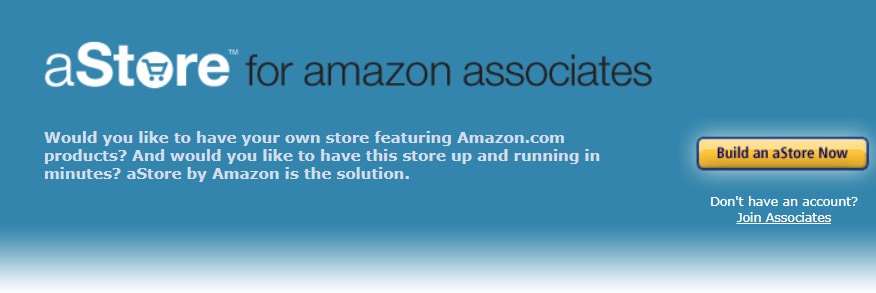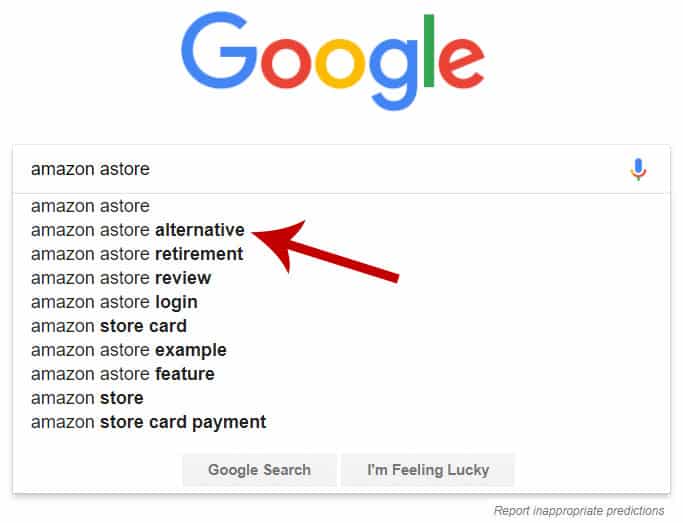Over the summer we had learned of Amazon’s decision to retire their aStore affiliate product. For many it came as a bolt from the blue. Various speculations (on the reasons behind the move) have been floating around the Web, and I’ve decided to throw in my two cents too.
Introduction
First things first… what is/was aStore?
When added to Amazon’s affiliate program in 2006 it was announced as “a new Associates product that gives you the power to create a professional online store, in minutes and without the need for programming skills.”

It was, essentially, a roll-out of brand-specific tool for working with the brand’s product feed. We had seen such tools offered by affiliate networks (e.g.: ShareASale‘s “Make-A-Page” feature which preceded aStore) as well as numerous third parties (e.g.: GoldenCAN which was launched back in 2005), but not so much by individual advertisers. So, Amazon was again a pioneer here. Of course, their affiliate program was (and still is) larger than many affiliate networks out there.
Possible Reasons
Fast-forward 11 years and the amazing feature is being shut down for good. Amazon itself lists five chief reasons for retiring their aStore product:
- Low effectiveness with “only 25% of active aStore pages” leading to sales;
- Lack of ongoing affiliate interest with “less than half of existing aStores updated since 2014”;
- Amazon’s prioritization of content generation which isn’t easily interwoven with aStores;
- Incompleteness of attribution when end users browse around an aStore without clicking through to Amazon’s website;
- SEO and usability considerations with aStore pages neither being search engine friendly, nor responsive to “render well on various mobile devices.”
Some, however, believe that there is yet another reason and it is an (6) incompatibility of this type of promotion with influencer marketing into which Amazon is actively tapping now.
Geno’s Take
There are three broad observations that I would like to outline in regard to this matter:
1. Over the past decade, there were other similar tools retired: from our own Free Dynamic Templates (launched in 2006, nominated for the Best Affiliate Tool of the Year, and retired 3 years later) to Product Showcase Creator (US), FusePump (UK), and an array of others. Conversely, though, we have also seen similar tools cash in on their technology. In 2013, for example, PopShops was acquired by Rakuten Marketing and, to date, it is running as a stand-alone affiliate tool (not made proprietary to Rakuten Affiliate Network alone).
I believe that there is (and will always be) room for such tools. After all, way too many online publishers (be they bloggers, topical influencers, or simply aspiring affiliates) are not technically savvy enough to code on their own. Their passion about a subject, and their expertise in it, drive audiences to them; and for brands to help them monetize their influence we should keep equipping such publishers with tools similar to aStore. Maybe (as was the case with our Free Dynamic Templates too) it does not make sense supporting a stand-alone tool (regardless of how prominent your affiliate program is). Partnering with other similar affiliate tools is a good alternative.
2. In the above-referenced Digitay article we read that affiliate marketing “often has this feel of being a bit more transactional and promotional” than the relational aspect that influencers are after. I disagree. Having been in the affiliate marketing industry for most of its history, I can testify to this: the most successful partnerships that I’ve had with those who monetize via affiliate links have always been highly personal and relational. It’s not that one is more “transactional” while the other is more “relational.” Each can be either of these. Don’t treat them as two competing elements of your marketing strategy! Influencer marketing is a type of marketing, while affiliate marketing is a marketing model. They can (and do) live happily together. In fact, it is when an affiliate model is interwoven into influencer marketing relationships, the ongoing revenue generation (through affiliate links) keeps motivating the influencer to press on beyond the original engagement.
3. Finally, I find it interesting to see this as the very top of Google Suggest long-tail terms for “amazon astore”:

Clearly, people (aware of the tool’s “retirement”) are actively looking for alternatives.
What do you make of Amazon’s move to retire aStore, and the lessons we can learn? Please use the “Comments” area below to contribute your thoughts.